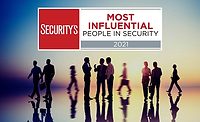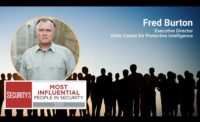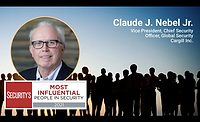Learning from the lessons of history
Yonah Alexander has worked on the forefront of terrorism studies for decades, publishing pioneering research and speaking, writing and analyzing terrorism across more than 50 countries over his 70-year career.
Now a Member of the Board of Regents, Senior Fellow and the Director of the International Center for Terrorism Studies (ICTS) at the Potomac Institute for Policy Studies, an Arlington, Virginia-based nonprofit public policy research institute, Alexander drives advances in terrorism studies and unclassified intelligence through supporting the four-pronged mission to monitor current and future terrorism threats; develop governmental and non-governmental response strategies; communicate on an ongoing basis with policymakers, academia, corporations and more; and researching critical challenges and present findings internationally.
According to Alexander, his life’s work in terrorism studies was inevitable. “I was eight years old when World War II began, and I grew up in Palestine before the creation of Israel and was exposed to numerous security challenges there. I began to wonder why acts of terrorism, state-sponsored violence and other forms of inhumanity were continuing, and so I chose to seek an answer to the question,” says Alexander.
Alexander studied under numerous distinguished academic and professional mentors as the field of terrorism studies grew, earning his Bachelor’s degree in Political Science from Roosevelt University, a Master’s degree in International Relations from The University of Chicago, and a PhD in Public Law and Government from Columbia University. He cites Dr. Edward Teller, one of the early members of the Manhattan Project, among others in Chicago as catalysts for his academic work in terrorism studies.
“I am deeply appreciative to numerous colleagues and mentors throughout the world who contributed to thinking and trying to develop communication and information sharing to see how we can respond effectively to terrorism and violence,” Alexander says.
He listed numerous American icons such as, Professor Hans Morgenthau, Justice Phillip Jessup and Madeleine Albright (Former Secretary of State) as mentors and inspirations to his career. During his long career, Alexander was also guided and interacted with Henry Kissinger, Stuart Eizenstat, Arthur Goldberg, Abraham Sofaer, Alfred Gray, Wesley Clark, William Webster, Clarence Kelley, Robert Mueller, Al Gore, Joseph Lieberman, Thomas Ridge and Rita Colwell. Additionally, he collaborated academically with many foreign leaders from Israel to Morocco and Japan. According to decades-long academic and professional assessments by members of the security community, Alexander’s accomplishments are, indeed, pioneering in an uncharted field.
Alexander has researched, chronicled and contributed to critical policy around terrorism since the 1950s. He has authored seminal works on al-Qaida, tracked cyber warfare from its inception, and documented the evolution of U.S. and international terrorism policy, among his more than 100 published books on terrorism and counterterrorism. He is the founder of five academic journals, including Terrorism; Minorities and Group Rights; Political Communication and Persuasion; NATO’s Partnership for Peace Review; and Terrorism: An Electronic Journal & Knowledge Base. Alexander’s work is archived in Stanford University’s Hoover Library and accessed regularly by other researchers in the field.
“Terrorists are not born, but they are created by different social, political, economic and strategic environments, as well as radicalizing efforts.”
— Yonah Alexander
He continues to publish reports and share geopolitical threat intelligence through his worldwide outreach, having in early 2023 released reports on security concerns in Latin America, as well as threats and responses in the African Sahel region. Across his research, Alexander seeks to identify signs of destabilization and the risk of violence by state and non-state actors.
“Terrorists are not born, but they are created by different social, political, economic and strategic environments, as well as radicalizing efforts,” says Alexander.
By recording and learning from historical lessons, Alexander’s research has helped identify warning signs preceding violence. Reflecting on his life’s work in terrorism studies, Alexander defines the importance of learning from history as one of his enduring motivators.
“We have to follow the lessons history teaches us in order to allow for international diplomacy, to continue to have patience, to listen, and to make sure we avoid violent situations, especially now that weapons of mass destruction can destroy the world,” Alexander says.
In addition to his publications, Alexander’s influence extends to the more than 50 countries involved in the academic and think-tank work to which he has contributed. Alexander has shared his historical and geopolitical insights at ASIS and Overseas Security Advisory Council (OSAC) events, mentored hundreds of security leaders who have gone on to roles in numerous government agencies and corporate security roles, and has consulted for corporate security entities regarding geopolitical risk and terrorism threats.
His work has bridged the communication gaps between societal sectors, as Alexander has worked to increase collaboration not just between government and private industry, but also with houses of worship, localities and individuals.
“This is really an involvement of every individual, corporation, government, academic institution, community and religion. With inspiration from these leaders, we cannot eliminate violence completely, but we can reduce current and future conventional and unconventional risks,” Alexander says.
Over his 70-year career studying acts of terrorism and the signs of escalating violence and instability, Alexander says he’s still optimistic for the globe’s future, as long as the world population cooperates in advancing this critical mission.
“The future will depend on society recognizing what are the major threats impacting international stability. We must emphasize active participation across different segments of society, not only in one country, but throughout the world. You cannot have security in a particular state when there’s insecurity in other countries.”
From the inception of his interest in terrorism studies, Alexander has striven to define the cyclical nature of violence and how societies can achieve peace with justice. He says his current focus is on educating the next generation of security, risk and world leaders to recognize historical patterns and prevent violence before it occurs.
“The key question, then, is whether civilization will survive? And my short answer is yes — if we want to learn from the lessons of history,” says Alexander.



